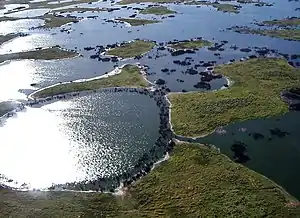

Flooded grasslands and savannas is a terrestrial biome of the World Wide Fund for Nature (WWF) biogeographical system, consisting of large expanses or complexes of flooded grasslands. These areas support numerous plants and animals adapted to the unique hydrologic regimes and soil conditions. Large congregations of migratory and resident waterbirds may be found in these regions. The relative importance of these habitat types for these birds as well as more vagile taxa typically varies as the availability of water and productivity annually and seasonally shifts among complexes of smaller and larger wetlands throughout a region.[1]
This habitat type is found on four of the continents on Earth. Some globally outstanding flooded savannas and grasslands occur in the Everglades, Pantanal, Lake Chad flooded savanna, Zambezian flooded grasslands, and the Sudd. The Everglades, with an area of 7,800 sq mi (20,000 km2), are the world's largest rain-fed flooded grassland on a limestone substrate, and feature some 11,000 species of seed-bearing plants, 25 varieties of orchids, 300 bird species, and 150 fish species. The Pantanal, with an area of 187,818 km2 (72,517 sq mi), is the largest flooded grassland on Earth, supporting over 260 species of fish, 700 birds, 90 mammals, 160 reptiles, 45 amphibians, 1,000 butterflies, and 1,600 species of plants. The flooded savannas and grasslands are generally the largest complexes in each region.[1]
See also
References
- 1 2
 This article incorporates text available under the CC BY-SA 3.0 license. World Wide Fund for Nature. "Flooded Grasslands and Savanna Ecoregions". Archived from the original on April 25, 2012. Retrieved May 29, 2019.
This article incorporates text available under the CC BY-SA 3.0 license. World Wide Fund for Nature. "Flooded Grasslands and Savanna Ecoregions". Archived from the original on April 25, 2012. Retrieved May 29, 2019.
External links
 Media related to Flooded grasslands and savannas at Wikimedia Commons
Media related to Flooded grasslands and savannas at Wikimedia Commons